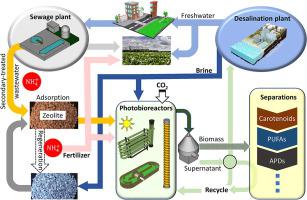当前位置:
X-MOL 学术
›
Bioresource Technol.
›
论文详情
Our official English website, www.x-mol.net, welcomes your
feedback! (Note: you will need to create a separate account there.)
Treatment of secondary urban wastewater with a low ammonium-tolerant marine microalga using zeolite-based adsorption
Bioresource Technology ( IF 9.7 ) Pub Date : 2022-06-17 , DOI: 10.1016/j.biortech.2022.127490 L López-Rosales 1 , P López-García 2 , M A Benyachou 2 , A Molina-Miras 2 , J J Gallardo-Rodríguez 1 , M C Cerón-García 1 , A Sánchez Mirón 1 , F García-Camacho 1
Bioresource Technology ( IF 9.7 ) Pub Date : 2022-06-17 , DOI: 10.1016/j.biortech.2022.127490 L López-Rosales 1 , P López-García 2 , M A Benyachou 2 , A Molina-Miras 2 , J J Gallardo-Rodríguez 1 , M C Cerón-García 1 , A Sánchez Mirón 1 , F García-Camacho 1
Affiliation

|
The low tolerance of marine microalgae to ammonium and hyposalinity limits their use in urban wastewater (UWW) treatments. In this study, using the marine microalga , it is demonstrated for the first time that this obstacle can be overcome by introducing a zeolite-based adsorption step to obtain a tolerable UWW stream. The maximum ammonium adsorption capacities measured in the natural zeolite used are among the highest reported. The microalga grows satisfactorily in mixtures of zeolite-treated UWW and seawater at a wide range of proportions, both with and without adjusting the salinity, as long as the ammonium concentration is below the threshold tolerated by the microalgae (6.3 mg L). A proof of concept performed in 10-L bubble column photobioreactors with different culture strategies, including medium recycling, showed an enhanced biomass yield relative to a control with no UWW. No noticeable effect was observed on the production of specialty metabolites.
中文翻译:

利用沸石吸附法用低耐铵海洋微藻处理城市二级废水
海洋微藻对铵和低盐度的低耐受性限制了它们在城市废水(UWW)处理中的使用。在这项研究中,利用海洋微藻,首次证明了可以通过引入基于沸石的吸附步骤来克服这一障碍,以获得可耐受的 UWW 流。在所使用的天然沸石中测得的最大铵吸附能力是报道中最高的。只要铵浓度低于微藻耐受的阈值 (6.3 mg/L),无论是否调整盐度,微藻都能在各种比例的沸石处理过的 UWW 和海水的混合物中令人满意地生长。在具有不同培养策略(包括培养基回收)的 10 L 鼓泡柱光生物反应器中进行的概念验证表明,相对于没有 UWW 的对照,生物量产量有所提高。没有观察到对特殊代谢物的产生有明显影响。
更新日期:2022-06-17
中文翻译:

利用沸石吸附法用低耐铵海洋微藻处理城市二级废水
海洋微藻对铵和低盐度的低耐受性限制了它们在城市废水(UWW)处理中的使用。在这项研究中,利用海洋微藻,首次证明了可以通过引入基于沸石的吸附步骤来克服这一障碍,以获得可耐受的 UWW 流。在所使用的天然沸石中测得的最大铵吸附能力是报道中最高的。只要铵浓度低于微藻耐受的阈值 (6.3 mg/L),无论是否调整盐度,微藻都能在各种比例的沸石处理过的 UWW 和海水的混合物中令人满意地生长。在具有不同培养策略(包括培养基回收)的 10 L 鼓泡柱光生物反应器中进行的概念验证表明,相对于没有 UWW 的对照,生物量产量有所提高。没有观察到对特殊代谢物的产生有明显影响。











































 京公网安备 11010802027423号
京公网安备 11010802027423号